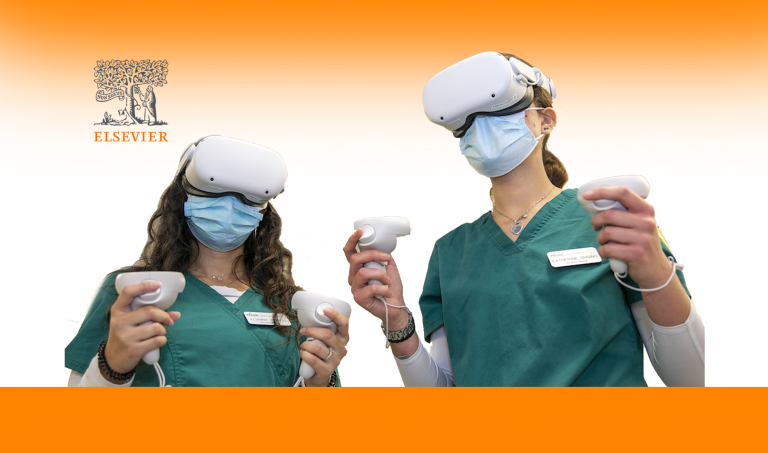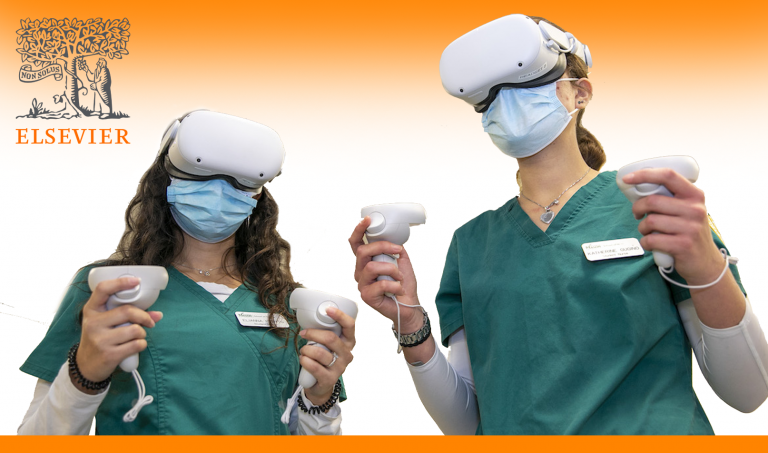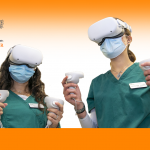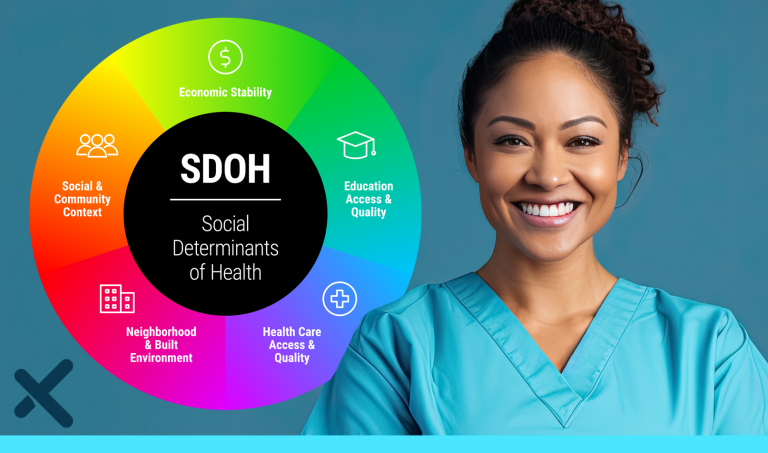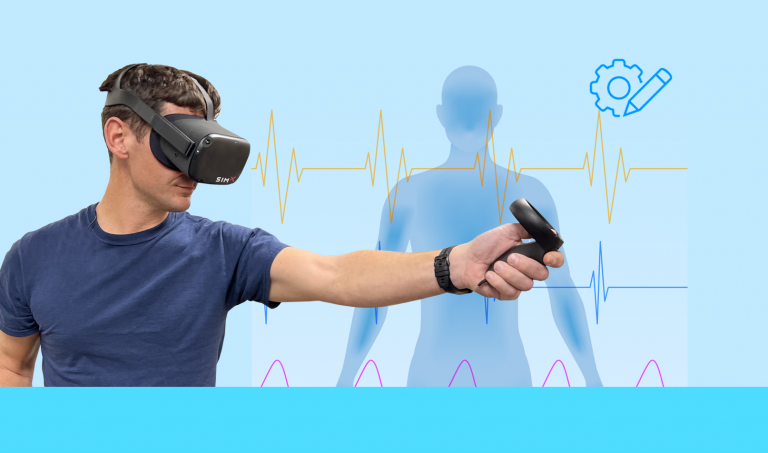The Most Comprehensive Virtual Reality Healthcare Curriculum:
The Simulation Learning System with VR” by Elsevier & SimX
Elsevier’s leading content and SimX’s best-in-class VR simulation engine power the most comprehensive VR healthcare curriculum ever developed–the Simulation Learning System with Virtual Reality (SLS with VR). Building on the Simulation Learning System’s evidence-based simulation scenarios and activities, SLS with VR features 100 virtual reality scenarios covering everything from home health to mass casualty, leveraging the latest virtual reality technology to provide students with a safe, immersive, and realistic virtual environment where they can gain valuable hands-on patient care experience and enhance clinical judgment skills.
SLS with VR was specifically designed for nursing students and is a complete solution for enhancing a learner’s clinical decision-making skills, bridging the gap between lectures and clinicals, and offering powerful assessment tools in an engaging and realistic virtual environment. This innovative solution is the largest and most comprehensive virtual reality curriculum for nursing education ever created. It reduces the need for sim labs, manikins, and associated equipment.
SLS with VR allows for the highest fidelity sim training and preparation for the Next Gen NCLEX-RN Exam. Find out how each scenario includes crucial pre- and post-simulation activities, debriefing guidance, an academic EHR, and more.
Simulation Learning System for Registered Nurses VR Scenario List
Health Assessment
Scenario HA 1-4 – Christina Brown – Contraception Initiation – Young Adult Female
Scenario HA 3-1 – Mary Cohen – Nursing Admission – Female
Scenario HA 3-3 – Mary Cohen – Domestic Violence
Scenario HA 9-1 – Marc Kozlov – Postoperative Respiratory Distress
Fundamentals
Scenario FUN 02 – Bernadette Jackson – Confusion in Older Adult with Infection
Scenario FUN 03 – Samuel Green – End-of-Life Care
Scenario FUN 04 – Jesus Garcia – Colostomy Care and Teaching
Scenario FUN 05 – Lisa Rae – Fall and Pressure Ulcer Risk Assessment
Scenario FUN 06 – Nancy Gilbert – Tracheostomy Care
Scenario FUN 07 – Carl Rogers – Diabetic Wound Care and Insulin Administration
Scenario FUN 08 – Maurice Arviso – Oxygenation and Hygiene
Scenario FUN 09 – Mary Bailey – Fluid and Electrolyte Management in Pregnant Patient
Scenario FUN 10 – Boyd Dubois – Postoperative Pain Management and Care
Scenario FUN 11 – Kyle Miller – Basic Assessment and Care Management
Scenario FUN 12 – Lillian Chambers – Postoperative Assessment and Surgical Site Care
Medical-Surgical
Scenario MED 02 – Wallace Peterson – Pneumonia with Acute Respiratory Distress and Oxygen Delivery
Scenario MED 04 – Kimberly Dunning – Asthma Exacerbation & Anxiety, Communication & Oxygen Delivery
Scenario MED 05 – Margaret Chan – Lung Cancer, Nausea & Hypokalemia
Scenario MED 08 – Ricardo Mendoza – Lung Cancer and Acute Tension Pneumothorax
Scenario MED 09 – Keola Akana – Heart Failure, Medicine Toxicity & Hypokalemia
Scenario MED 11 – Melody Dixon – Myocardial Infarction and Management of Unstable Patient
Scenario MED 18 – David Montanari – Spinal Cord Injury and Postoperative Atelectasis
Scenario MED 23 – Lou Thao – Abdominal Surgery and Patient Controlled Analgesia
Scenario MED 24 – Lou Thao – Abdominal Surgery and Postoperative Fluid Volume Deficit
Scenario MED 26 – Lucia Hoyos – Colostomy and Hyperkalemia Secondary to Medication Error
Scenario MED 28 – Cynthia Bennet – Urinary Tract Infection and Anaphylactic Reaction
Scenario MED 29 – Taylor Westfield – Gastrointestinal Bleed
Scenario MED 33 – Arthur Harris – Diabetes and Severe Acute Hypoglycemia
Scenario MED 35 – Janet Owen – Pancreatitis, Alcohol Withdrawal
Scenario MED 37 – Susan Weil – Hip Fracture and Blood Transfusion
Scenario MED 38 – Susan Weil – Hip Fracture and Pulmonary Embolism
Scenario MED 40 – Agnes Taylor – Hip Fracture, Wound Infection & Early Sepsis
Scenario MED 41 – Mathias Hedding – Wound Debridement and Pain Management
Scenario MED 43 – Keola Akana – Acute Renal Failure and Hyperkalemia
Scenario MED 45 – Matt Slattery – Hemothorax with Chest Tube and Drug Overdose
Maternity
Scenario MAT 01 – Darlene Hall – Intimate Partner Violence
Scenario MAT 02 – Jessie Baer – Insulin-Dependent Gestational Diabetes/Preterm Labor
Scenario MAT 03 – Meagan Solitas – Late Pregnancy Bleeding/Placenta Previa
Scenario MAT 04 – Becca Roberts – Hyperemesis Gravidarum
Scenario MAT 05 – Amber Rhodes – Preeclampsia, HELLP Syndrome
Scenario MAT 06 – Rona Berends – Preeclamptic Seizure
Scenario MAT 07 – Carole Shotz – Scheduled Cesarean Delivery
Scenario MAT 08 – Abby Frank – Fetal Demise, Induction
Scenario MAT 09 – Kaira Abbot – Medical Induction/Fetal Distress
Scenario MAT 10 – Kaelyn Renard – Intrapartal Infection
Scenario MAT 11 – Diana Akita-Byrd – Birth Plan, Group B Beta Streptococcus Positive
Scenario MAT 13 – Reanne Zoller – Post-Term Birth/Distress/Meconium
Scenario MAT 14 – Nakita Brown – Fetal Distress/Meconium
Scenario MAT 15 – Danica Crowley – Neonatal Resuscitation, Narcotic
Scenario MAT 16 – Haley Bellows – Neonatal Resuscitation/Cardiac Anomaly
Scenario MAT 17 – Maria Fernando – Shoulder Dystocia, Neonatal Resuscitation
Scenario MAT 18 – Deborah Nelson – Newborn Care
Scenario MAT 19 – Stacey Downes – Postpartum Hemorrhage/Uterine Atony
Scenario MAT 20 – Maddy Martin – Postpartum Hemorrhage/Vaginal Hematoma
Scenario MAT 21 – Macy Polenski – Postpartum Hemorrhage/Placenta Increta
Pediatric
Scenario PED 06 – Haley Medvedev – Bronchiolitis, Management of Respiratory Distress
Scenario PED 08 – Tran Meng – Dehydration, Specimen Collection
Scenario PED 09 – Aaron Jackson – Hirschsprung’s Disease, Ostomy Care
Scenario PED 10 – Isabella Burgel – Congestive Heart Failure, Acute Hypokalemia Management
Scenario PED 11 – Johnny Parker – Nasogastric Tube Replacement, Medication Administration
Scenario PED 12 – Mandy Rhodes – Possible Bacterial Meningitis, Medication Error Prevention
Scenario PED 13 – Carolina Samolis – Cerebral Palsy, Tracheostomy Care/Sputum Culture
Scenario PED 14 – Carolina Samolis – Cerebral Palsy, Gastrostomy Tube Management
Scenario PED 15 – Danielle Baker – Urinary Tract Infection, Anaphylactic Reaction
Scenario PED 16 – Pedro Gomez – Compound Fracture, Varicella Management
Scenario PED 20 – Cooper Madison – Closed Head Injury, Seizure Management
Scenario PED 21 – Suzie Porter – Acute Lymphoblastic Leukemia, Platelet Transfusion
Scenario PED 24 – Emilia Garcia – Acute Asthma, Management of Impaired Gas Exchange
Scenario PED 25 – Dylan DiSabatino – Partial-Thickness Burns, Sterile Dressing Change
Scenario PED 26 – Monique Jones – Sickle Cell Anemia, Management of Sickle Cell Crisis
Scenario PED 27 – Annabell Flaherty – Gunshot Wound, Management of Hypovolemic Shock
Scenario PED 30 – Abdullah Yusuf – Acute Appendicitis, Preoperative
Scenario PED 31 – Abdullah Yusuf – Acute Appendicitis, Postoperative
Scenario PED 32 – Ricky Alvarez – Diabetes Mellitus, Hyperglycemia Management
Scenario PED 33 – Kyle Reeves – Cystic Fibrosis, Management of Respiratory Arrest
Psychiatric
Scenario PSY 01 – Cecil Whitver – Depression
Scenario PSY 03 – Indira Desai – Anxiety/Stress Management
Scenario PSY 04 – Jodie Bennett – Bipolar/Mania
Scenario PSY 05 – Tyler Morgan – Drug Abuse
Scenario PSY 06 – Charlotte Lewis – Schizophrenia/Psychosis
Scenario PSY 08 – Jessie Hernandez – Post-traumatic Stress Disorder
Scenario PSY 09 – Marcie Anderson – Obsessive Compulsive Disorder
Scenario PSY 10 – Ri Liang – Dementia
Scenario PSY 11 – Tessa Walker – Personality Disorder
Scenario PSY 12 – Gwen Harrison – Older Adult Abuse
Community
Scenario COM 01 – Wallace Peterson – Home Health: COPD/Pneumonia
Scenario COM 02 – Margaret Chan – Home Health: Hospice
Scenario COM 03 – Bradley Wright – Home Health: Heart Failure
Scenario COM 04 – Ricky Alvarez – School Health: Diabetic
Scenario COM 05 – Emilia Garcia – School Health: Asthma Exacerbation
Scenario COM 06 – Darlene Hall – Public Health: STI
Scenario COM 07 – Mary Cohen – Occupational Health: Workplace Injury
Scenario COM 08 – Kelly Grey – Occupational Health: Stroke/MI Assessment
Scenario COM 09 – Juan Hernandez – Vulnerable Populations: Migrant Farm Worker/Tuberculosis
Scenario COM 10 – Tyler Morgan – Vulnerable Populations: Mental Health
Scenario COM 12 – Multiple – Community Health: Multiple Casualty Incident
Scenario COM 13 – Patient zero – Community Health: Bioterrorism
Leadership
Scenario LED 01 – Margaret Chan – Medication Error with Root Cause Analysis
Scenario LED 02 – Susan Weil – Rapid Response
Scenario LED 03 – Lisa Rae/Carl Rogers/Maurice Arviso/Boyd Dubois – Managing Care of Multiple Patients
Learning Objectives
- Clinical Judgment & Decision Making:
- Develop advanced clinical judgment skills by immersing in a variety of patient care scenarios.
- Enhance critical decision-making abilities under pressure, especially in emergency situations like mass casualties.
- Hands-on Patient Care:
- Gain practical experience in a range of patient care tasks such as tracheostomy care, colostomy care, medication administration, and more.
- Understand the nuances of patient handling, communication, and physical examination in a safe, controlled environment.
- Clinical Assessment:
- Learn to conduct thorough health assessments for patients in various conditions, from respiratory distress to domestic violence situations.
- Master the art of identifying symptoms, diagnosing conditions, and prescribing the right course of action.
- Specialized Care Scenarios:
- Acquire knowledge in specialized areas of nursing care, including pediatrics, maternity, psychiatric, community, and leadership scenarios.
- Understand and manage conditions like preeclampsia, cerebral palsy, depression, COPD, and more.
- Next Gen NCLEX-RN Exam Preparation:
- Familiarize with the structure, format, and type of questions found in the Next Gen NCLEX-RN Exam.
- Apply knowledge and skills from the VR scenarios to potential exam situations.
- Ethical & Communication Skills:
- Develop the ability to handle sensitive subjects like domestic violence, end-of-life care, drug abuse, and mental health with compassion and professionalism.
- Enhance interpersonal and communication skills for effective patient care and collaboration with healthcare teams.
- Technology & Record-keeping:
- Familiarize with the usage of academic EHR (Electronic Health Records) and understand its importance in modern healthcare.
- Learn the best practices in maintaining, updating, and retrieving patient records.
- Debriefing & Feedback:
- Understand the importance of post-simulation activities and self-reflection.
- Engage in debriefing sessions to identify strengths, areas of improvement, and lessons learned from each VR scenario.
- Holistic Healthcare Approach:
- Gain insights into integrating theoretical knowledge from lectures into practical scenarios.
- Develop a holistic understanding of patient care, factoring in physiological, psychological, and social aspects.
- Resource Management & Leadership:
- Learn to manage multiple patients simultaneously, prioritize care based on severity, and allocate resources efficiently.
- Cultivate leadership skills in guiding and managing healthcare teams, especially in scenarios that require rapid response and decision-making.
These learning objectives provide a roadmap for students to understand the depth and breadth of their VR healthcare curriculum and set clear expectations for what they will gain from this comprehensive training.
MINIMUM:
OS: Windows 10
Processor: Intel Core i5-2300 | AMD FX-4350
Memory: 4 GB RAM
Graphics: Nvidia GeForce GTX 2060
DirectX: Version 11
Storage: 12 GB available space
RECOMMENDED:
OS: Windows 10
Processor: Intel Core i7-2300 | AMD FX-4350
Memory: 8 GB RAM
Graphics: Nvidia GeForce GTX 3060
DirectX: Version 11
Storage: 12 GB available space
Interested in this scenario?
Sign up to talk with a member of the SimX team today!

